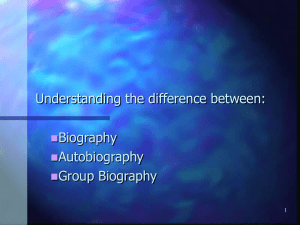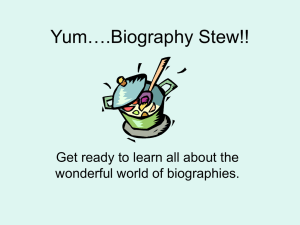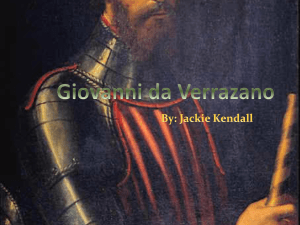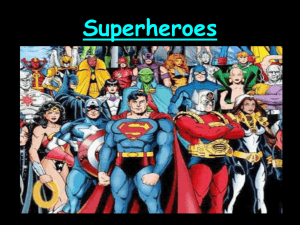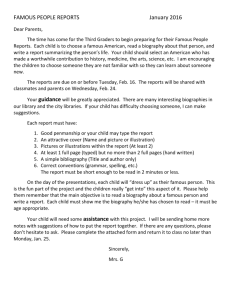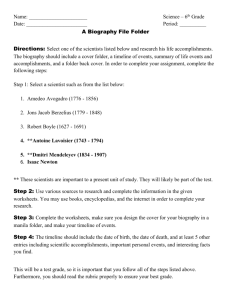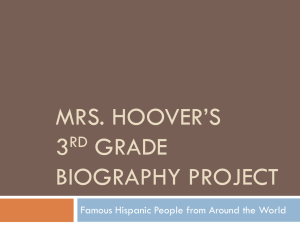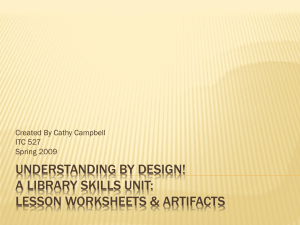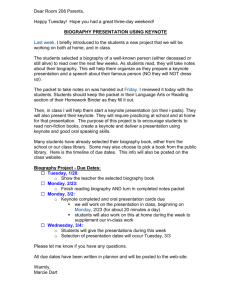EDE 302- ELA Unit Plan
advertisement
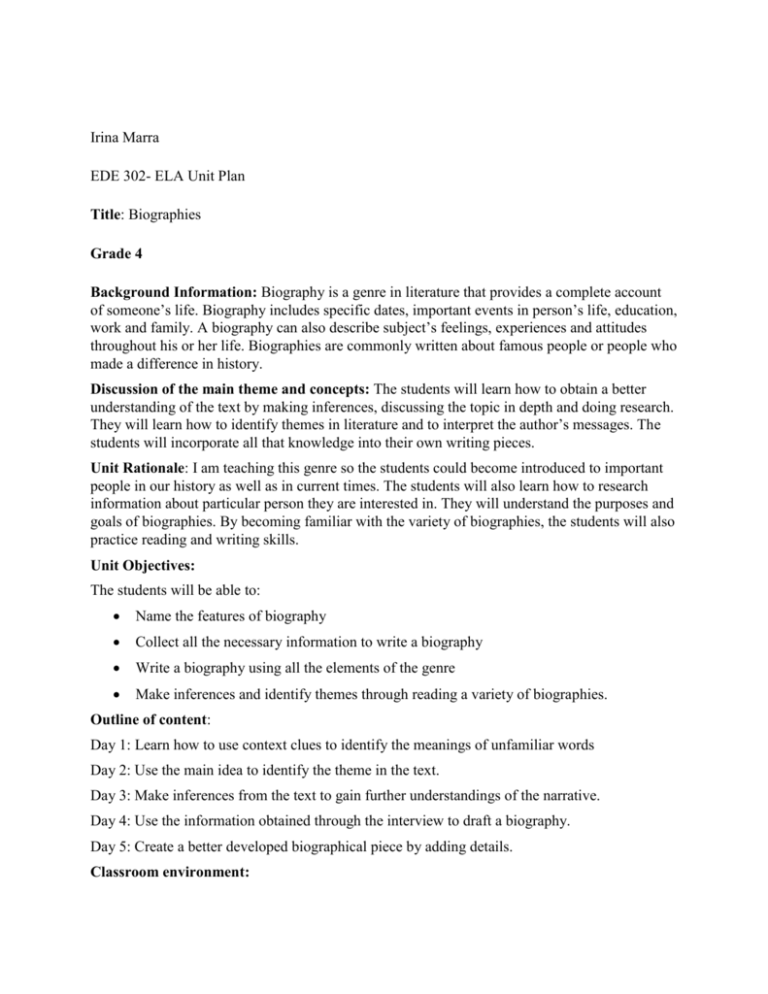
Irina Marra EDE 302- ELA Unit Plan Title: Biographies Grade 4 Background Information: Biography is a genre in literature that provides a complete account of someone’s life. Biography includes specific dates, important events in person’s life, education, work and family. A biography can also describe subject’s feelings, experiences and attitudes throughout his or her life. Biographies are commonly written about famous people or people who made a difference in history. Discussion of the main theme and concepts: The students will learn how to obtain a better understanding of the text by making inferences, discussing the topic in depth and doing research. They will learn how to identify themes in literature and to interpret the author’s messages. The students will incorporate all that knowledge into their own writing pieces. Unit Rationale: I am teaching this genre so the students could become introduced to important people in our history as well as in current times. The students will also learn how to research information about particular person they are interested in. They will understand the purposes and goals of biographies. By becoming familiar with the variety of biographies, the students will also practice reading and writing skills. Unit Objectives: The students will be able to: Name the features of biography Collect all the necessary information to write a biography Write a biography using all the elements of the genre Make inferences and identify themes through reading a variety of biographies. Outline of content: Day 1: Learn how to use context clues to identify the meanings of unfamiliar words Day 2: Use the main idea to identify the theme in the text. Day 3: Make inferences from the text to gain further understandings of the narrative. Day 4: Use the information obtained through the interview to draft a biography. Day 5: Create a better developed biographical piece by adding details. Classroom environment: During the read aloud the students will be asked to sit closer to the teacher so that they will be able to hear the story better and to see the illustrations. Teaching Materials: Book- Lives of the Athletes by Kathleen Krull. Book -Albert Einstein a Biography by Milton Meltzer Book- Black Stars of Colonial and Revolutionary Times African Americans Who Lived Their Dreams by Jim Haskins Website -http://gardenofpraise.com Self-made worksheets. Evaluation: Classroom discussions Worksheets Graphic organizers Biographical piece written by the students at the end of the unit Bibliographies: Wikipedia.org http://www.readwritethink.org/classroom-resources http://www.scholastic.com/teachers/lesson-plan/introducing-biographies-getting-knowyou Technology: The students could use internet to find articles for their homework assignments. The students could use online dictionaries to find definitions of unfamiliar words. Special Education: The reading materials will be given according to the students’ reading levels. The teacher will read the text to the struggling readers. The teacher can ask the students to answer the questions about the text rather than write them down. Lesson 1 Vocabulary Focus: The students will learn how to use context clues to figure out meaning of unfamiliar words by reading the story “Thanks, King” Jim Thorpe from the book Lives of the Athletes by Kathleen Krull. Attention-grabber: “Today Chabarubas were supposed to perform in our school. However, their drummer got a very nasty cold, and they had to reschedule.” Who are Chabarubas? What can you tell about them from the context? Mini-lesson: I will explain to the student that sometimes we could use the context to figure out the meaning of unfamiliar words. I will demonstrate or read the following example from the blurb of the book. “Babe Didrikson Zaharias won eighty-two golf tournaments- and when she beat a man, she _____________________, “And me just a little old gal!”” What word fits best here? ( expected answers -said, screamed, yelled) I will record the answers on the board. I will inform the students that the word the author had used in this sentence is gloated. I will ask the children to think about what Babe Didrikson might have felt when she was the first woman to beat a man. I will ask them to come up with a definition for the word gloat based on the context. I will define the word gloat. Objective: 1. The students will learn how to use context, surrounding words and sentences to figure out the meaning of unfamiliar words. 2. The students will learn new vocabulary words and write sentences with those words. 3. The student will identify the genre of the book. Materials: 1. Book- Lives of the Athletes by Kathleen Krull 2. Worksheets Procedure: I will give out worksheets and ask the students to look through it before they start reading. I will give out copies of the story and ask the students to read silently (or the students could take turns reading out loud) I will ask the students to fill out the worksheet as they read the story. The students will share their definitions with the rest of the class and will explain why they came to such conclusions. I will give the actual definitions, and the students will write them down in their worksheets. Assessment: I will walk around the room and look at students’ responses. During the discussion I will be able to tell how many students participate and how many students seem confused. If students don’t actively participate, I will go over the worksheet with the whole class. For homework, the students will be asked to write sentences using the vocabulary words from the worksheet. Worksheet 1. The word spectators most likely means________________________________________________ __________________Which context clues did you use? __________________________________________________________ __________________________________________________________ ________________________________________ Definition: __________________________________________________________ _________________________________________________________ 2. The word campaigned most likely means _____________________________________________________ How can you tell?__________________________________________________ ______________________________________________________ ____________________________________ Definition: ______________________________________________________ ______________________________________________________ 3. The words fabled most likely means________________________________________________ Why do you think so?___________________________________________________ ______________________________________________________ ____________________________________ Definition: ______________________________________________________ ______________________________________________________ 4. The word prejudice most likely means______________________________________________ How did you figure that out? ______________________________________________________ ______________________________________________________ ____________________________________ Definition: ______________________________________________________ ______________________________________________________ 5. The word petition most likely means ______________________________________________________ __________________ Why? ______________________________________________________ ______________________________________________________ Definition: __________________________________________________________ __________________________________________________________ Lesson 2 Identifying the Themes State standard: Focus: The students will learn how to use the main idea to identify the theme through reading the book Albert Einstein a Biography by Milton Meltzer. Attention –grabber: “If you were to write a book, what lesson would you teach your readers about life?” Mini-lesson: I will explain that writers write books for different purposes. One of such purposes is to share an opinion about life and teach their readers a certain lesson. I will define the word theme. I will explain that every piece of literature has a theme or multiple themes. I will remind the students how to find the main idea and inform them that we could use the main idea to identify the theme. I will make an example using the story The Three Little Pigs. I will explain that one of the main ideas in that story is that the pig who built the strongest house survived the wolf. I will then ask the students what kind of lesson it might teach us. I will record the students’ answers on the board. I will then explain that those are the themes of the story. Objectives: The students will be able to: Define the term theme. Explain how the main idea is different from the theme. Identify the theme using the main idea Identify the main idea using the theme Materials: Book – Albert Einstein a Biography by Milton Meltzer Notebooks Worksheets Procedure: I will give out worksheets and ask the students to read the story. I will explain that the students will have to refer to the main ideas in the story to identify the themes. The students will work in groups and will discuss their answers before writing them in their worksheets. Assessment: As the students discuss the theme of the story of the Three Little Pigs, I will be able to tell if they understand the difference between the main idea and the theme. I will walk around the room as they students work in groups and make sure that their answers are correct. Follow-up: For homework I will ask the students to read an article from newspapers and to identify at least one theme. Worksheet Main Idea Albert Einstein worked hard all his life to become a great scientist. Albert’s teachers and even his own parents did not believe in Theme him, but he proved them all wrong. Lesson 3 Topic: Making Inferences Grade: 4 Focus: The students will learn how to make inferences from the text through reading the biography of Benjamin Banneker from the book Black Stars of Colonial and Revolutionary Times African Americans Who Lived Their Dreams by Jim Haskins. Attention-grabber: “I should have never given my dog a chicken bone. They charged me $850 at the animal hospital that night!” What do you think happen to the dog? Are chicken bones bad for dogs? Do you think I will ever let my dog eat a chicken bone again? Mini-lesson: I will explain to the students that, even though I did not mention anything about my dog getting sick, we were able to figure that out based on what was said. That means we made an inference. I will record on the board the definition of the verb “infer”. I will explain that making inferences is making logical guesses using clues from the text. Making inferences helps us understand what we read better and to read beyond the text. I will explain that making inferences is a very important skill because it develops our thinking and common sense. Objectives: The students will be able to: Define the skill “making inferences” Explain why it is important to make inferences. Make inferences from the text Materials: Book – Black Stars of Colonial and Revolutionary Times African American who Lived Their Dreams by Jim Haskins Notebooks Worksheets Procedure: I will give out the worksheets. I will read the story of Benjamin Banneker to the students. I will stop reading occasionally and ask the students to answer the questions on their worksheets. Assessment: The worksheets will demonstrate if the students understand the concept of making inferences. Follow-up: The students will be given graphic organizers where they would have to make inferences from the books they are currently reading. Worksheet: 1. Why do you think there were strict laws against interracial marriages? ______________________________________________________ ______________________________________________________ _____________________________________________________ 2. What can you infer about colonial schools? ______________________________________________________ ______________________________________________________ ______________________________________________________ 3. Why do you think only few books were available at the time? What can that tell you about education during colonial times? ______________________________________________________ ______________________________________________________ ______________________________________________________ ______________________________________________________ 4. What kind of person do you think George Ellicott was? ______________________________________________________ ______________________________________________________ ______________________________________________________ ______________________________________________________ 5. Why do you think Benjamin Banneker sent a copy of his calendar to Thomas Jefferson? ______________________________________________________ ______________________________________________________ ______________________________________________________ Lesson 4 Topic: Writing a Biography Focus: The students will learn how to write a biography by interviewing a family member. Attention-grabber: Do you have a role model in your family? Why do you look up to that person? Why is that person important to you? Mini-lesson: I will read a biography of Barack Obama. I will point out how the author included all the features of biography in the biography of Barack Obama such as specific dates, significant events, background information and names of family members. I will explain that those are all important elements of biographies that the students would have to incorporate in their writing pieces. Objectives: The students will be able to: List all the features of biography. Collect necessary information for the biographical piece through an interview. Write a well-developed biography. Materials: Biography of Barack Obama from the website http://gardenofpraise.com Graphic organizers Notebooks Procedure: Prior to this lesson, I will give out these graphic organizers and ask the students to interview a family member. Person’s name, date of birth and place. Personal background ( important dates, education, occupation) Personal traits Important events Current situation I will ask the students to write the first draft of the biography listing all the events in sequence. 1. For the second draft I will ask the students to add: More adjectives to describe the person and make examples. 2. The feelings that the person had when certain events took place. 3. Interesting and surprising facts that will make the reader interested. 4. What you admire about the character. 5. A lesson that the reader can learn from the person you writing about. The students will revise their biographical pieces. Assessment: I will use the rubric to grade the biographies. Follow-up: For homework the students will have to compare and contrast biography to fiction.
